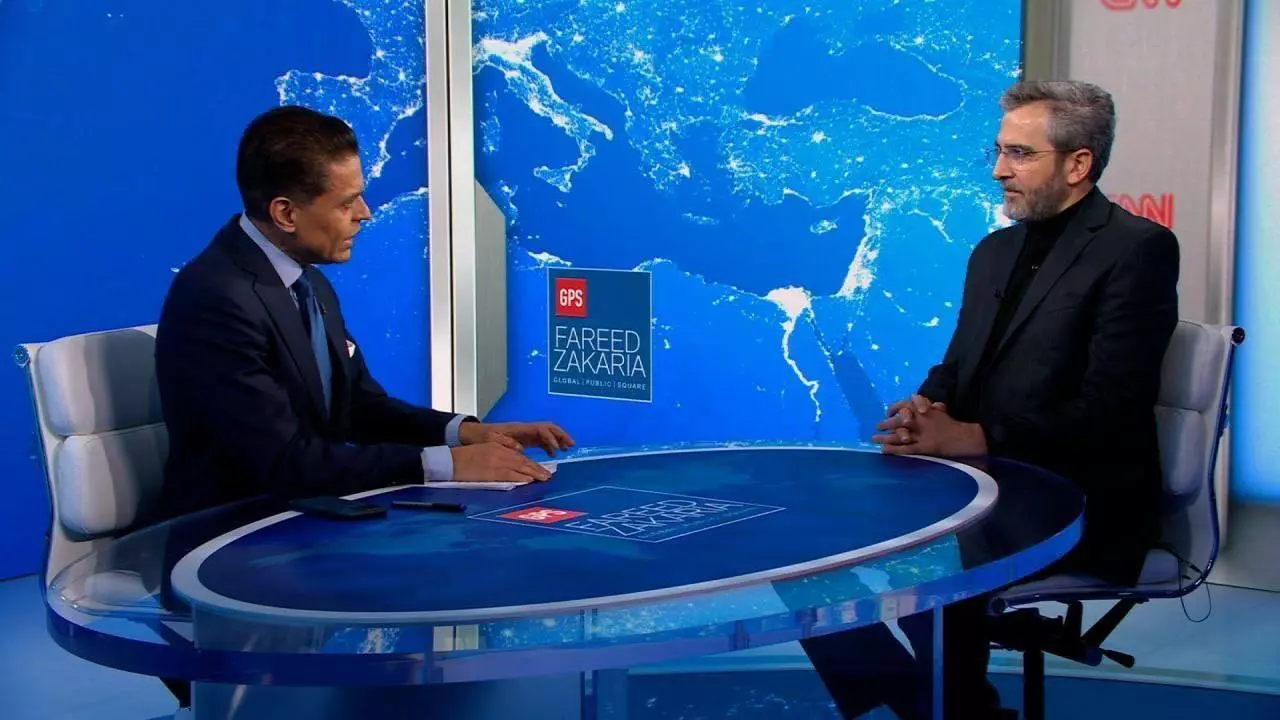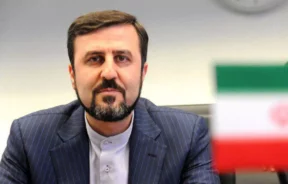Bagheri in an Interview with CNN: We Are Not Seeking a New Agreement
WANA (July 18) – Ali Bagheri, Acting Foreign Minister of Iran, spoke with Fareed Zakaria, the renowned American journalist, on CNN.
The questions in this interview revolved around allegations regarding Iran’s role in the assassination plot against Trump, the Gaza war and the future of Palestine, nuclear negotiations, Iran’s future policies on expanding its activities, Masoud Pezeshkian‘s election victory, and the future leadership in Iran.
Read the full interview below:
Fareed Zakaria: Thank you for joining us, Mr. Acting Foreign Minister. My first question concerns a report published by CNN; this news points to information received by the U.S. government. The National Security Council has passed information to intelligence services indicating a plot by the Islamic Republic of Iran to assassinate former U.S. President Donald Trump in retaliation for the killing of General Qasem Soleimani, the senior Iranian commander, during the Trump administration. What can you say about this?
Bagheri: As you know, immediately after General Soleimani‘s assassination, the Islamic Republic of Iran initiated legal and judicial proceedings to pursue this case, both in Iranian courts and through international legal mechanisms, to prosecute those who ordered, executed, and assisted in this assassination. Therefore, the Islamic Republic of Iran will use all domestic and international legal capacities to ensure justice in this case.
Fareed Zakaria: But after Soleimani’s assassination, the Iranian government promised revenge. There is also a separate report from a few months ago indicating an attempt or conspiracy to assassinate John Bolton, the former National Security Advisor. Has Iran undertaken such efforts? Can you also deny the attempt to assassinate Bolton?
Acting Foreign Minister: your points are related to internal U.S. issues and the conflicts between American factions.
Fareed Zakaria: Are you saying the Iranian government has had no connection whatsoever with the 20-year-old individual who attempted to assassinate Donald Trump?
Bagheri: As I said, the Islamic Republic of Iran only uses legal and judicial mechanisms, both domestic and international, to secure its rights and bring to justice those who ordered, executed, and assisted in this criminal act.
Fareed Zakaria: Let me ask about what is happening in Gaza and Israel. The war continues, and I would like to know if you believe that Hezbollah, the Lebanese militia, is sufficiently threatened to be drawn into this war or whether it might decide to enter the war to support Hamas. What is your view on the possibility of this war expanding to the north?
Acting Foreign Minister: Everyone knows that the conflict in southern Lebanon stems from Zionist crimes in Gaza. For over nine months, due to the ongoing crimes and genocide by the Zionists in Gaza, various resistance domains in the region have become active against the Zionists. Therefore, whenever the Zionist crimes in Gaza end, it is expected that the resistance in other areas will not take action. But as long as the Zionist crimes and genocide in Gaza continue, it is naturally the right of the resistance to act according to its interests.
Fareed Zakaria: Is there a possibility that this war could escalate? I mean, Hezbollah has so far been relatively restrained, and Israel has also shown restraint on that front. Is there a risk of escalation?
Bagheri: As the Islamic Republic of Iran, we have never welcomed an escalation of tension in the region and the spread of conflict from Gaza to the outside of Gaza. But it is the Zionists who have repeatedly threatened Lebanon. It seems that the failures and defeats of the Zionists led them to escalate the tension to other areas to compensate for their failures and defeats in Gaza. However, this so-called approach of the Zionists, to escalate the conflict and tension to different places in the region, is a strategic mistake that will undoubtedly not only not benefit them but also expose them to severe dangers.

Bagheri: Israel is not a legitimate state, it is only an occupying regime
WANA (July 17) – Statement by H.E. Mr. Ali Bagheri, Acting Minister of Foreign Affairs of the Islamic Republic of Iran, Before the United Nations Security Council On “the Situation in the Middle East, including the Palestinian Question” – 17 July 2024 – New York In the Name of Allah, the Most Compassionate, the […]
Fareed Zakaria: No trips have been planned.
Head of Foreign Policy: There has been no visit at the highest levels yet, but it is on the agenda for both the Iranian and Saudi sides.
Fareed Zakaria: You were fundamentally opposed to the Iran nuclear deal. You are seen as a hardliner in the Iranian system. You argued against the nuclear deal in the parliament, and you also argued against [former] President [Hassan] Rouhani and [former] Foreign Minister [Mohammad Javad] Zarif. Those who have won the elections come from the same part of Iran’s political system, which is sometimes called reformist or moderate. Does this mean that Iran’s foreign policy will change? Your rivals are gaining power.
Head of Foreign Ministry: The terms hardliner or moderate are defined within the framework of Western political categorization; we do not have anything called hardliner or moderate in Iran. There are different ideas for governance, which is a reality, but we don’t have hardliners or non-hardliners. Naturally, this indicates the freedom, democracy, and political vitality in Iran, where people can choose different individuals or movements based on their priorities at other times; this is a reality that Americans and some Western countries do not want to believe. Democracy in Iran is a reality with its requirements and conditions. We are proud of this democracy and take pride in it. Naturally, this democracy will lead to our country’s and our nation’s growth and progress.
Fareed Zakaria: But this type of democracy is unusual because the person who recently won the presidential election had been twice disqualified from running but was ultimately approved by the Guardian Council. Are you saying that his views and yours are the same?
Bagheri: He was not disqualified, as you mentioned, because he served as a parliament member before the presidential election and had been in parliament for several terms. Mr. Pezeshkian was previously a member of parliament, then later ran for the presidency. He is currently the President of the Islamic Republic of Iran and, in fact, the head of my country; all the people of Iran accept and acknowledge him as the President.
Fareed Zakaria: Do you agree with his views on hijab?
Head of Foreign Policy: The President is the primary person responsible for implementing the laws in the country. Indeed, he will govern the country within the framework of the laws of the Islamic Republic of Iran. Everyone will consider various laws in different areas and must accept them; this is natural.
Fareed Zakaria: I’m not sure I understood your answer correctly. He says people should not tell women what to wear. He has made statements indicating he does not support the strict enforcement of the hijab [law]. Do you agree with him?
Head of Foreign Ministry: He has not said that the law should not be enforced. If anyone, regardless of their position, believes that a law is not correct or complete or sees it as flawed in a democratic society, they must seek to change the law through legal channels.
Fareed Zakaria: Your Supreme Leader is 85 years old. There is talk about the possibility that the next stage might not see another individual as the Supreme Leader but rather a leadership council or changes in how this system is structured in Iran. Is this possible, or will we see another successor to [Ayatollah Seyyed] Ali Khamenei?
Bagheri: In our previous constitution, there was a leadership position and council. However, several decades ago, when our constitution was amended, the leadership council was removed, and only an individual was designated as the Supreme Leader to hold the highest position in governing the country. Therefore, our constitution does not have anything called a leadership council.
Fareed Zakaria: Let me make sure I understood your response to the question I asked at the beginning of the program. Are you categorically denying that Iran or any element of Iran, the IRGC, or Iran-backed militias had any plans to attempt to assassinate Donald Trump?
Head of Foreign Policy: As I clearly stated to you, we have used and will use only our domestic legal and judicial frameworks and international legal and judicial mechanisms to seek justice regarding those who ordered, carried out, and were involved in the assassination of General Soleimani.
Fareed Zakaria: But this implies non-violent actions. When you say legal and judicial actions, do you mean international courts and things of that nature?
Head of Foreign Ministry: We have used and will continue to use only lawful legal and judicial mechanisms domestically and internationally. This is our right. The Americans have explicitly stated that they assassinated Iran’s top military commander. Naturally, we must address this assassination, and those accused in this matter must be tried by a competent court and punished according to the court’s ruling.













